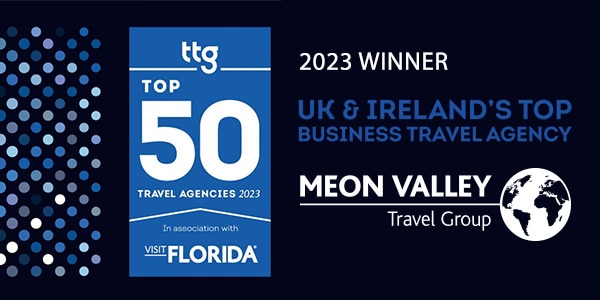Spring is about to be sprung, but it’s also when we’re coming up to the next financial year and boards are looking at how much we spend on travel.
Many will inevitably be thinking “Boy, this is expensive” and at Meon, we get that. Our experience tells us there are reasons why finance directors are suddenly raising a quizzical eyebrow if they see an unnecessary expense given that we’re now firmly in the face-time era.
In part, travel is expensive because more is being conducted by the C-suite (who, and let’s be blunt here, don’t like to slum it). Data tells us that average durations are longer – what was once a three-day trip is now five days. That’s a 60% increase and to the bean counters, this looks like a big uplift.
What’s happening however is that travellers are merging multiple meetings to make sure they optimise their time. Quite often it includes a weekend too. The finance director though, only sees the cost and rightly asks the pressing question of “How much are we now spending on this, and why?”
That means we see a call from someone saying: “We need to think about how we get our costs down”. The first thing they ask is if they can lower their booking fee from £30 to £20 – not quite scratching the surface when you’ve spent £5k on a trip.
Few companies or CFO engage ROI with their TMC – and that’s exactly what we could be focussing on.
Common thinking suggests ROI should be in the region of 25 times the cost of travel. So £1,000 spent on travel should equate to at least £25,000 in extra revenue for your organisation – otherwise, you should question whether it’s worth it, and if you should have a Teams call instead.
It’s such an important concept that we’ve challenged our account management team to make ROI part of our advisory process. To this end, Meon’s account management programme is being repurposed to Client Success, and renamed accordingly, because success is measured in so many more important post-pandemic ways now, including ROI.
Duty of Care
Also, ROI is not the only thing decision-makers must consider in the new business travel landscape. We’re all familiar with duty of care, but how about your employees’ self-worth too? Where do you sit in this debate?
Flying to New York for 24 hours for a Monday meeting is so often a norm we see but nowadays, almost everyone is also looking at blended travel. You might instead offer your key personnel the option to stay the weekend beforehand to make it more rewarding for the individual – so your team member feels appreciated and valued and likewise starts to look after your business partners that little bit better.
It’s something we’ve certainly found at Meon with our own staff. Here, we believe work/life balance isn’t a conflict if you love your work and it can be complimentary. That’s something we encourage in our clients – you’re sending them away from their families, so make them feel better about it.
We’re starting to see this trend on European trips, where same-day turnarounds are becoming a thing of the past – because admit it, no one wants to get a 06:30 flight to Frankfurt on a Monday morning and a midnight return home. Now you stay overnight, fresh to do business the next day. It can cost more, but it will be justified by ROI because you’re equipping your staff to do their job in the best possible way, and your relationships, and business miraculously grow.
Think about it, it makes sense, doesn’t it? And at Meon, we like to think we distil common sense in a world where sense isn’t always common.






